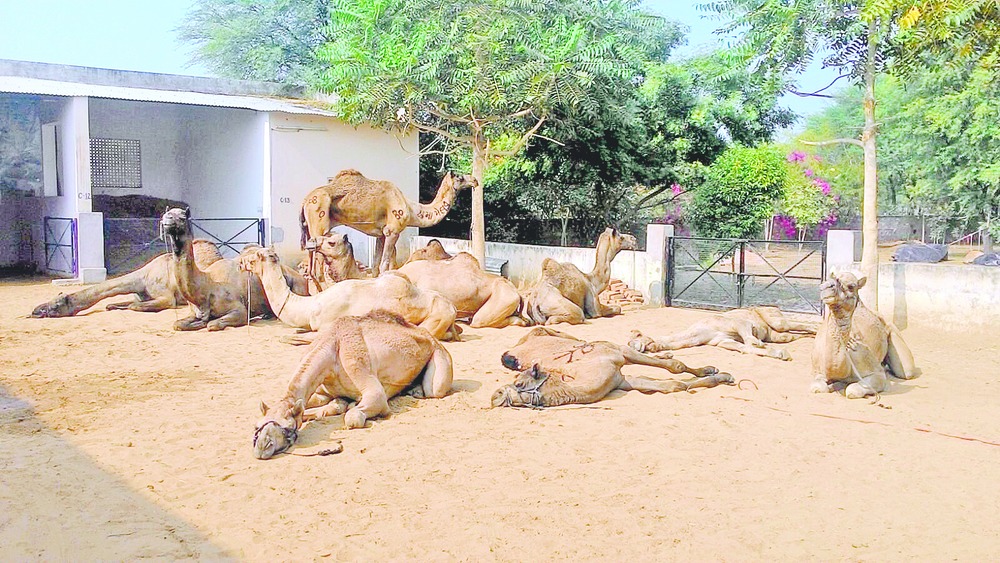
Jaipur, July 17: The distance this trusting band of travellers had walked added up to more than 30 marathons.
The prize that awaited them? The butcher's cleaver. It was sheer luck it didn't come to that.
At least 85 dehydrated camels, made to walk over 1,300km from Rajasthan to Hyderabad last month to be killed for their meat, have been rescued by animal rights activists, but traumatised and nearly starved.
Now Rajasthan is in no hurry to take them back. "Bringing them back will be difficult, especially giving them space," animal husbandry minister Prabhu Lal Saini told The Telegraph last week.
So the camels, intercepted early last month in Telangana's Ranga Reddy district, about 150km from Hyderabad, are still in the interim custody of the People For Animals (PFA), the NGO that saved them from the abattoir.
"About 90 per cent of these camels, some lactating, some pregnant and around 10 calves are weak, wounded and in trauma. Almost starved, their soft padded feet have been damaged during the long journey," Vasanthi Vadi, secretary, PFA (Hyderabad), said.
Sources in the NGO said the camels were smuggled out of Jhalawar district, chief minister Vasundhara Raje's constituency, to get around Rajasthan's strict laws on slaughtering the state animal.
The Rajasthan Camel (Prohibition of Slaughter and Regulation of Temporary Migration or Export) Actbans slaughter, trade and unauthorised transportation of camels. Killing camels can land a person in jail for up to five years.
This was not the first time that camels - domesticated in Rajasthan for their milk and for carrying goods and sometimes used to even till the fields - had been intercepted in another state.
"Last year we transported 63 camels from here (Telangana) back to their home in Rajasthan. It cost us Rs 12 lakh," PFA official Vadi said.
Rakesh Kumar, veterinary head of Rajasthan's only Camel Rescue Centre in Bassi, about 35km from here, said Bangalore police had intercepted five camels being smuggled out for slaughter a few months ago. "They were so sick that four of them died," Kumar said.
Camel meat available outside the state costs around Rs 280 a kilo.
Animal rights activists say one reason behind the recent cases of camel smuggling could be the younger generation was not interested in breeding. Figures tell the story: the state has around 4 lakh camels now, down from around 10 lakh in the mid-1990s.
A countrywide Supreme Court ban on grazing in forest areas has also meant that camels remain chronically hungry.
An adult camel needs 12-15kg of food every day, which comes to Rs 100, and a concentrate that costs around Rs 150. So a camel owner has to spend at least Rs 250 every day to keep it healthy. When that becomes difficult, or camels fall sick, owners have little option but to sell them to smugglers.
Development too played its part, with roads even in isolated areas and motorised transport taking the place of the tall, hardy animals, man's desert workhorse for centuries.
But even by their sturdy standards, 1,300km - or thirty 42km marathons - must have been tough for the abattoir-bound 85. "Their wounds remained unattended during the trip and became severe, with maggots eating into live tissues," PFA official Vadi said.
The smugglers broke another regulation - the Transport of Animal Rules, 1978 - that says animals to be transported should be certified fit by a veterinary doctor.
The camels' handlers, who have been arrested, didn't have any papers with them when they were intercepted. The law also says pregnant and young animals should be transported by truck or by train.
Vadi said the NGO would need "at least 23 trucks" and "more than Rs 14 lakh" to take the camels back home. "We don't have that much funds."











